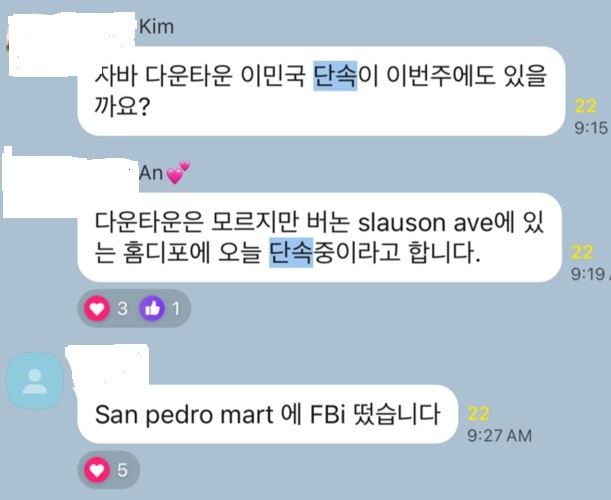Immigrant communities across Southern California, including Korean Americans, have formed coordinated networks to reduce the impact of ongoing ICE immigration raids, more than six months after intensified enforcement began. Residents are sharing real-time alerts through messaging apps and volunteer patrols across multiple neighborhoods.

At the LA Fashion District’s Java Market, Jin Lee (42) uses a large KakaoTalk group chat—operating since June—as a primary source of ICE field-enforcement updates. “People immediately report what is happening inside or near shops,” he said. “The room used to be for job and daily-life information, but now enforcement alerts take up a bigger share. We invite only verified people to protect information.”
About 40 shop owners in the Java Market also run a WhatsApp group that has operated for six months to maintain a shared response system. A Korean American owner identified as Mr. Park said, “Even undocumented employees with no criminal history hesitate to come to work, so we needed a way to track attendance and know what’s happening.”
According to LA Public Press, immigration authorities have been using unmarked vehicles during operations, prompting immigrant advocacy organizations and volunteers to build local monitoring teams. Wearing matching shirts, volunteers track possible ICE agent movements around East LA, South LA, Bell, Pasadena, and nearby business districts.
Volunteers distribute flyers containing immigrants’ rights information and emergency contact numbers. When they identify a vehicle believed to be carrying ICE agents, they immediately relay alerts through emergency channels.
National rapid-response teams also use noise to draw attention at enforcement sites. Volunteers bang pots, sound car horns, or use megaphones to pressure agents to withdraw. A Pasadena volunteer identified as Elizabeth said, “If we see an SUV that ICE uses often, we immediately alert the entire block. Residents gather, honk their horns, and shout, ‘Leave this place.’”
Separately, the LA Times reported that during the November 12 gathering of the USCCB (United States Conference of Catholic Bishops) in Baltimore, bishops adopted a statement saying they “oppose indiscriminate and large-scale deportations.” Of the 224 voters, 216 supported the statement. According to the LA Times, it was the first time in 12 years that Catholic bishops publicly opposed a specific federal policy.
BY HYOUNGJAE KIM [kim.ian@koreadaily.com]
![Troublesome delivery robots damage gardens, snarl streets Delivery robots in urban areas including LA Koreatown and Hollywood have been involved in a string of incidents, blocking fire engine responses, crossing police lines at active scenes, and colliding with homes and motorcycles. [KTLA • Reddit capture]](https://www.koreadailyus.com/wp-content/uploads/2026/02/0226-delivery-robot-compile-100x70.jpg)
![Nonprofit leaders accused of diverting millions meant for the vulnerable Judy Baca, who faces allegations of embezzling $5 million, participates in work on “The Great Wall of Los Angeles” mural in 2023. [Sangjin Kim, The Korea Daily]](https://www.koreadailyus.com/wp-content/uploads/2026/02/0226-nonprofit-1-100x70.jpg)
![Family of army veteran killed in San Antonio shooting launches fundraiser A screenshot of the GoFundMe fundraising page created for Kyung Chang Lee. Donations are being collected to support the family of Lee, who was killed in the San Antonio, Texas, shooting. [GoFundMe capture]](https://www.koreadailyus.com/wp-content/uploads/2026/02/0225-KyungChangLee-100x70.jpg)
![Cartel leader’s killing sparks unrest, prompts Koreans to reconsider Mexico trips Downtown Guadalajara in Mexico’s state of Jalisco, which resembled a war zone on February 22 amid arson and other violence by drug cartel members, appears quiet on February 24. The area, usually crowded with tourists and residents, saw a sharp decline in foot traffic and public transportation use. [Pablo Lemus Navarro/X account]](https://www.koreadailyus.com/wp-content/uploads/2026/02/0225-Mexico-100x70.jpg)